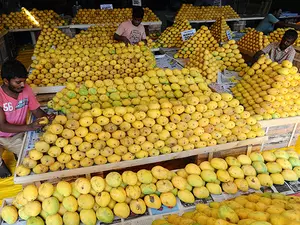
TN's mango farmers in crisis as Iran-Israel conflict hit exports
Despite bumper crop, TN's mango farmers are grappling with low rates like ₹3 per kg, stalled exports due to Iran-Israel conflict; farmers protests are escalating

Farmers in Tamil Nadu’s Krishnagiri, Tiruvallur, and Vellore districts are grappling with a severe crisis. Although ideal weather resulted in a bumper mango crop this season, plummeting prices and a freeze on exports—partly due to the Iran-Israel conflict—have left them struggling to stay afloat. Farmers' protests have escalated leading to police cases which is adding to their problems.
For the past six days, farmers have been dumping their produce on roads and even felling mango trees to protest against low procurement prices, as companies offer them as little as Rs 3 per kg for certain varieties like Banganapalli.
The state’s mango cultivation, spanning 1.46 lakh hectares across districts like Krishnagiri, Dindigul, Dharmapuri, and Madurai, has yielded a record 9.5 lakh tonnes this year, surpassing the usual 5-6 lakh tonnes. However, the surplus has driven the prices down of this king of fruits, with traders procuring premium varieties like senthoora and alphonso at ₹10-12 per kg, while juice-grade mangoes fetch just ₹4-5 per kg.
Farmer Ramaraj from Krishnagiri lamented, “At ₹3 per kg, how can we survive? We hoped this year’s high yield would offset losses from past droughts and pest attacks, but it’s become a nightmare.”
Also read: Andhra vs Karnataka: Why Totapuri mango has sparked an inter-state feud
Stalled exports
The ongoing Iran-Israel conflict has disrupted Tamil Nadu’s mango exports, especially mango pulp, a key commodity. Iran is one of the largest buyers of this mango pulp.
E Madhavan, secretary of the Krishnagiri-Dharmapuri Mango Pulp Production Association, told The Federal, “The war has stalled export orders. Ocean freight costs have skyrocketed due to the Russia-Ukraine conflict and Red Sea attacks, and the Iran-Israel tensions have made matters worse. We’re sitting on unsold stock from last year when we bought mangoes at ₹26 per kg, and companies are hesitant to procure this season.”
GST woes
Adding to their woes, the GST rates of 12 per cent on mango pulp—compared to the 5 per cent demanded by producers—and reduced demand for natural mango juice in favour of carbonated drinks have hit the industry hard. Globally, India supplies 70 per cent of the world’s mango pulp, but market dynamics have shifted.
“In 2022, low yields led to high procurement prices, pushing buyers to source from countries like Mexico, South America, and Africa. Companies have also reduced the mango pulp content in juices from 17 per cent to 10 per cent, further denting demand,” Madhavan added.
Also read: UP: Dussehri mango goes global; first consignment exported to Dubai
Farmers’ protests have escalated, with some resorting to extreme measures like uprooting trees in areas like Thattakkal and Agaram in Krishnagiri. Police have filed cases against protesting farmers, adding to their grievances.
The farmers are now demanding a minimum support price for mangoes, compensation of ₹30,000 per acre for damaged trees, and the release of ₹2.62 crore in pending compensation for 665 farmers affected by last year’s drought. They also urged the state government to establish a fruit processing unit in Krishnagiri and procure mangoes directly, similar to initiatives in Andhra Pradesh and Karnataka.
To revive the industry, stakeholders have proposed that the government promote mango juice as an energy drink rich in Vitamin C, include it in school nutrition programmes, and increase export incentives, which have been slashed from 5 per cent to 1 per cent.
They have also called for the creation of a Mango Board to regulate prices and streamline export logistics.

